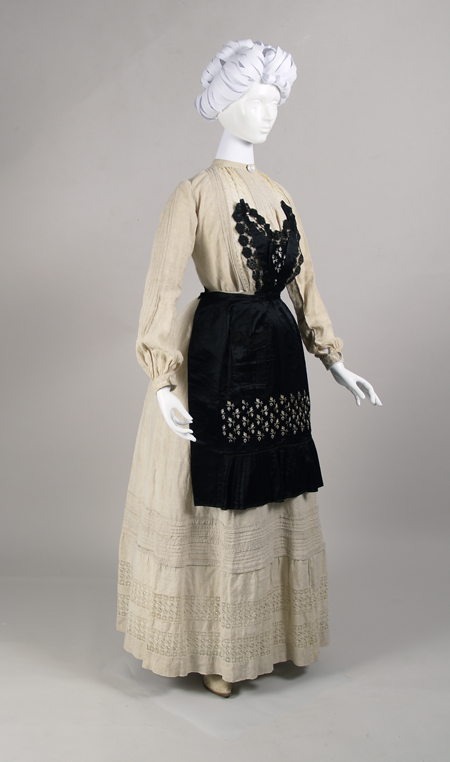
1
Beige Pintuck Dress
Unknown Maker. Canada, ca. 1900s
Plain woven linen, cutwork.
Anne Lambert Clothing and Textiles Collection. Donated by Marj Watt (1993.6.3ab).
Worn with:
Black Embroidered Bib Apron
Unknown Maker, Scotland, mid to late 19th century.
Sateen, cotton embroidery, machine lace, and seed beads.
Anne Lambert Clothing and Textiles Collection. Donated by Janice Hanson (1997.4.5).
Beige Heels
Unknown Maker or Origin ca. 1900s
Tanned leather.
Anne Lambert Clothing and Textiles Collection. Donated by Margaret Gower (1991.27.6ab).
Paper hair by Carolina Amaral.
2
“Signet Platinum” Dinner Service
Wedgewood, England,1994 and after.
Used by Leah Hrycun (1981- ) in Edmonton, Alberta ca. 2000-present.
Bone china with platinum leaf.
Anonymous loan.
“Oxford Platinum” Water Goblet and Wine Glass
Royal Doulton, England, 1998-2004.
Used by Leah Hrycun (1981- ) in Edmonton, Alberta ca. 2000-present.
Lead Crystal with platinum leaf.
Anonymous loan.
“Tramontina” Silverwear
Brazil, late twentieth century.
Inox.
Anonymous loan.
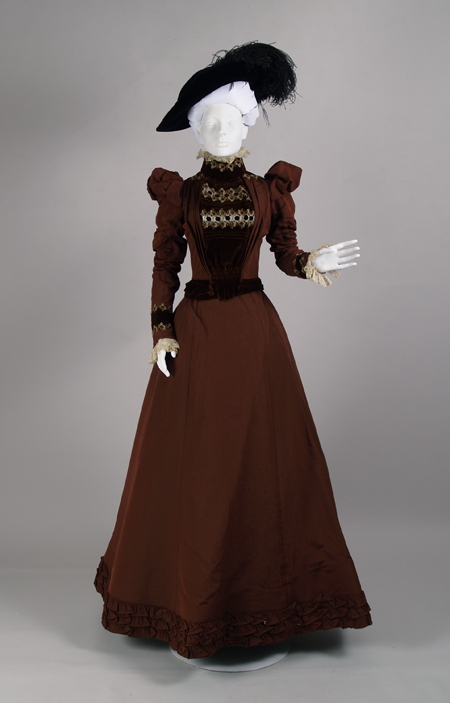
3
Brown Dress
Unknown Maker and Origin. ca. 1890s.
Plain taffeta, velvet, machine lace.
Anne Lambert Clothing and Textiles Collection. Transferred from the University of Alberta Drama Department (1977.5.22).
Worn with:
Black Feathered Hat
Unknown Maker, Canada, ca. 1898-1900.
Velvet, ostrich feathers.
Anne Lambert Clothing and Textiles Collection. Donated by Mrs. A. W. Frost (1976.21.3).
Kid Leather Gloves
Unknown maker and origin, 19th to 20th century.
Kid Leather, bronze buttons.
Anne Lambert Clothing and Textiles Collection. Donated by Eva Wiltshire (1996.9.2gf).
Brown Boots
Known Maker, USA, Washington, ca. 1900s.
Leather.
Anne Lambert Clothing and Textiles Collection. Donated by Banff Centre of Fine Arts (1981.13.94ab).
Paper hair by Elizabeth Brandeau.
4
Carved Eastlake Style Wood Chair and Table
Unknown maker and place of origin, late 19th century. Purchased in Edmonton in 2019.
Wood (table and chair) and cotton velvet (chair).
Exhibition props.
“Old Country Roses” Tea Pot, Cream and Sugar with Platter, Tea Cup and Saucer
Royal Doulton, Royal Albert, designed by Harold Holdcroft, United Kingdom, 1962 and after. Used by Phina Liske (1927-2010) in Onoway and Stony Plain, Alberta ca. 1969-2004.
Bone china with gold leaf.
Anonymous loan.
Today, as in the 19th century, women care for and value china. This collection has been passed down through three generations of women and now belongs to the great grand-daughter of the original owner.
 5
5
Burgundy Tea Gown
Unknown maker and place of origin, ca. 1891.
Made from a European (likely Scottish) “Paisley” shawl.
Human Ecology’s Anne Lambert Clothing and Textiles Collection. Donated by Jessie Lloyd (2000.2.1ab).
Worn with
Brown Boots
Godman, Unknown Origin, Late 19th century.
Leather.
Human Ecology’s Anne Lambert Clothing and Textiles Collection. Donated by Banff Centre of Fine Arts (1981.13.85ab).
Paper hair by Leah Hrycun.

6
Copper Quilted House Coat
Unknown creator, United Kingdom, England, ca. 1936.
Rayon Taffeta.
Human Ecology’s Anne Lambert Clothing and Textiles Collection. Donated by Dr. Robert H. Blackburn (1990.20.13).
Worn with:
Black Suede T-strap High Heeled Shoes
Clarks, United States of America, 2007.
Anonymous loan.
Paper hair by Loretta Yau.
This house-coat, like others in this exhibition, evokes images of home and domestic space. Through the use of padding (8a) and quilting (6, 7, and 8a), these fanciful interior gowns also hinted at the sophistication of its wearer. This style of house-coat (6) “is destined to elevate those little evenings at home from the commonplace to an event.”[1]
[1] “Vogue Designs for Dressmaking: Gifted Ideas to Work On,” Vogue (New York) December 1, 1936, 96.
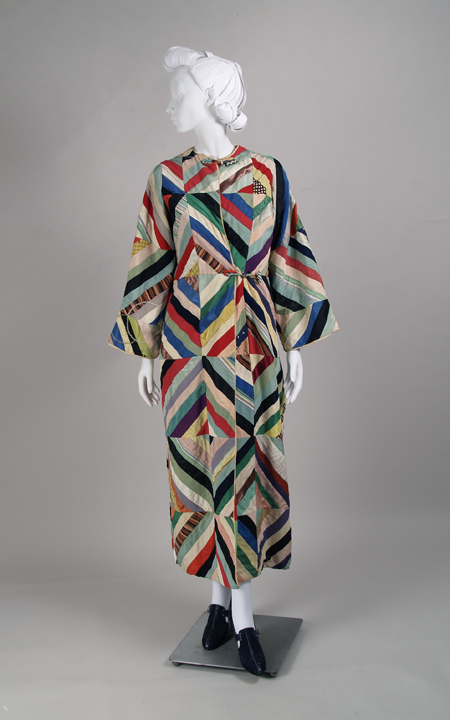
7a
Quilted Dressing Gown or House Coat
Unknown creator, Canada, Nova Scotia, ca. 1939-1945.
Assemblage of rayon and silk fabrics and embroidery thread. Metal buttons.
Human Ecology’s Anne Lambert Clothing and Textiles Collection (1987.13.2).
Worn with:
Blue Suede High Heeled Shoes
Royal Quality, unknown place of origins, ca. 1940s.
Human Ecology’s Anne Lambert Clothing and Textiles Collection. Acquisition (1990.55.21).
Paper hair by Anne Bissonnette.
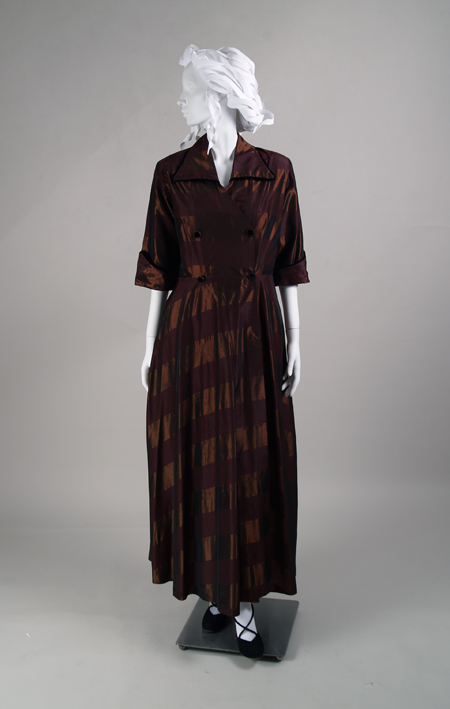
7b
Rust Striped Hostess Dress
Unknown creator, Canada, Ontario, Toronto, ca. 1936-1959.
Rayon Taffeta and silk velvet trim.
Human Ecology’s Anne Lambert Clothing and Textiles Collection. Donated by Erica Bottcher (1996.28.2).
Worn with:
Black Suede High Heeled Shoes
I Miller, Great Britain, England, ca. 1950s.
Human Ecology’s Anne Lambert Clothing and Textiles Collection. Donated by Mrs. Ruth McKinley (1990.40.20).
Paper hair by Donalee Riley.
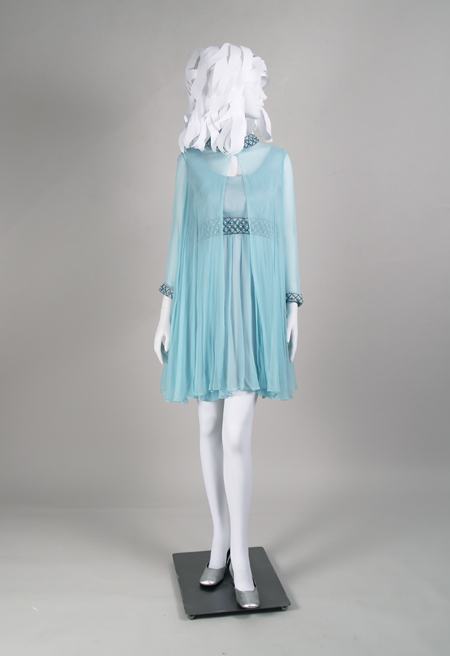
8b
Turquoise Overdress with Beaded Collar and Cuffs over Turquoise Dress with Beaded Waistband
“Junior Vogue,” United States of America, New York, ca. 1960s.
Nylon, plain chiffon, plastic beads.
Anne Lambert Clothing and Textiles Collection. Donated by Mrs. Phoebe Campbell (1987.66.1ab).
Worn with:
Silver Pumps
Wild Wolleys, likely worn in North America, ca. 1960s.
Synthetic materials.
Anne Lambert Clothing and Textiles Collection. Donated by Lynn Podgurny (2017.5.1).
Paper hair by Cybil Cameron.
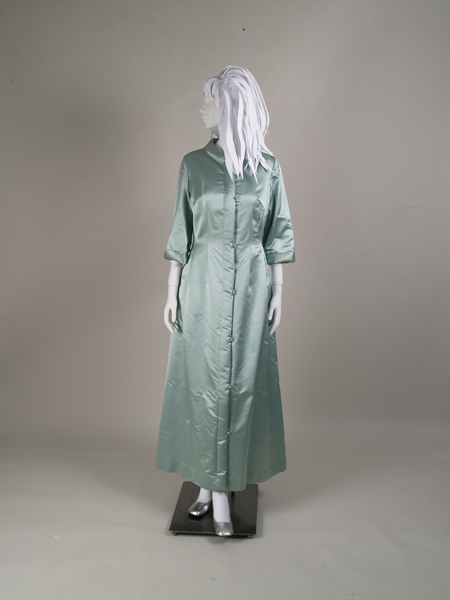
8a
Turquoise Hostess Gown
Dynasty, Hong Kong. Belonged to Dr. Margaret (Marmie) Perkins Hess, member of the Order of Canada (1982), ca. 1960s.
Shiny silk plain weave satin with corded buttons.
Human Ecology’s Anne Lambert Clothing and Textiles Collection. Hess Bequest (2018.11.13).
Worn with:
Silver Pumps
Fantiques brand, unknown place of origin, likely worn in Canada, Edmonton, ca. 1965.
Synthetic materials.
Anne Lambert Clothing and Textiles Collection. Donated by Jo-Ann Prodor (1999.54.9).
Paper hair by Gabriella Sequeira.

9
Rust Hostess Gown
Unknown maker and place of origins, ca. 1930.
Silk satin with silk chiffon inserts.
Human Ecology’s Anne Lambert Clothing and Textiles Collection. Donated by Charlotte Massy (1972.8.3).
Worn with
Black Leather Shoes with Broguing
“Combination Fitting,” unknown maker and place of origins, ca. 1920s-30s.
Leather.
Human Ecology’s Anne Lambert Clothing and Textiles Collection. Purchase (1990.55.19ab).
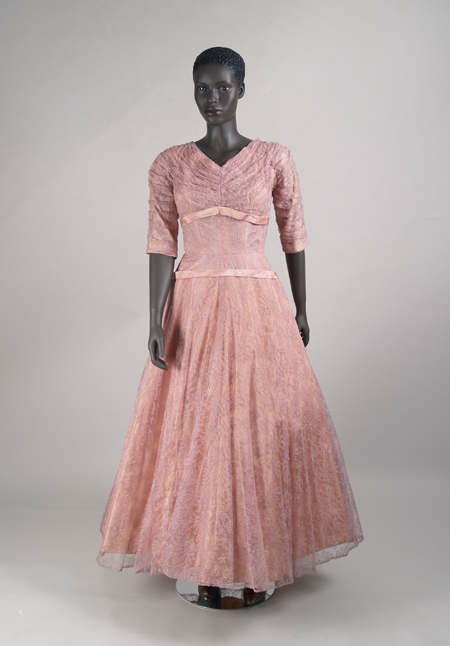
10a
Pink Lace Dress
Unknown Maker, Canada, Alberta, ca. 1950s.
Acetate taffeta, machine lace, taffeta ribbon, pelon lining.
Anne Lambert Clothing and Textiles Collection. Donated by Richard Y. Secord (1981.23.7).
Worn with:
Bronze Leather T-strap High Heeled Shoes
Werner Kerr, Italy, ca. 2004.
Anonymous loan.
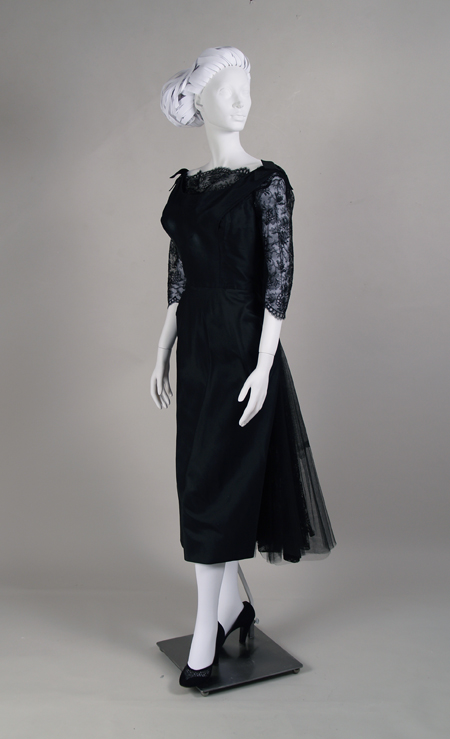
10b
Black Cocktail Dress with Back Draping
Edward Abbott, Canada, ca. 1955.
Rayon faille.
Human Ecology’s Anne Lambert Clothing and Textiles Collection. Donated by Mrs. Ruth Bowen (1978.14.22).
Worn with:
Black Suede Pumps with Black Lace Insets
Skyline “in your width” Clarks Masterpiece, North America, ca. 1951.
Donated by Jane Fitzpatrick (2013.3.2.a).
Paper hair by Amelia Vadnais.
11
Cocktail Shaker
Unknown maker and place of origins, ca. 2000
Metal.
Anonymous loan.
Martini Glasses
Unknown maker and place of origins, ca. 2000.
Leaded glass.
Anonymous loan.
Accent Table
Unknown maker and place of origins, ca. 1950s-1970s.
Wood.
Purchase.
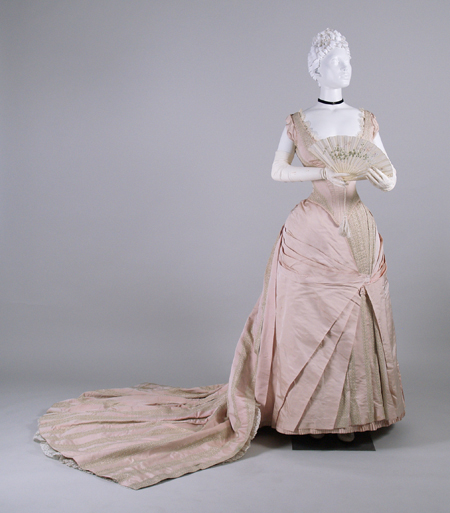
12
Pink Evening Dress
Unknown maker, United Kingdom, ca. 1880s.
Plain and brocaded silk faille.
Human Ecology’s Anne Lambert Clothing and Textiles Collection (1987.27.1).
Worn with
Black Ribbon Neck Ribbon with Ornament
Late 19th- early 20th century.
Silk, brass, and rhinestone.
Human Ecology’s Anne Lambert Clothing and Textiles Collection. Donated by Shirley Ronaghan (1989.8.21).
Ivory Silk Satin Shoes, ca. 1900-1905.
Human Ecology’s Anne Lambert Clothing and Textiles Collection. Donated by Robert Folinsbee (1992.3.1ab).
Paper hair by Loretta Yau.
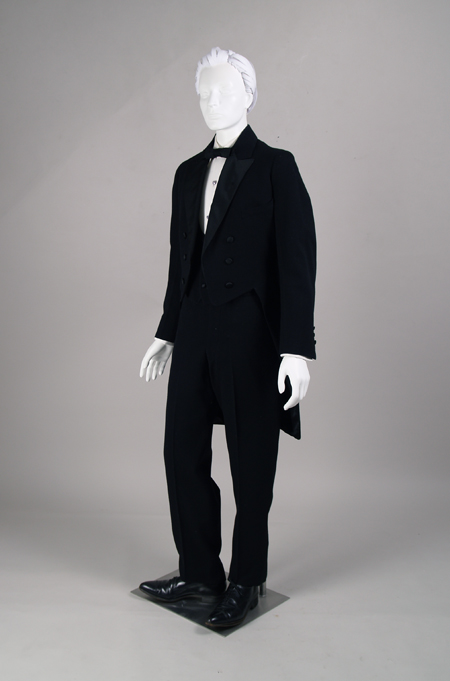
13
Black Double-Breasted Tuxedo
Unknown maker, North America, ca. 1924.
Wool suiting, silk satin lapels and silk braid.
Human Ecology’s Anne Lambert Clothing and Textiles Collection. Donated by G.H. Linney (1981.12.16a-c).
Worn with:
White Striped Cotton Shirt
Arrow Shirt Company, Canada, ca. 1920s.
Starched cotton shirting
Human Ecology’s Anne Lambert Clothing and Textiles Collection. Donated by Mrs. Lillian E. Linney (1981.12.7e).
Black Silk Satin Bow Tie
Unknown manufacturer and place of origin, ca. 1850-1990.
Silk satin
Human Ecology’s Anne Lambert Clothing and Textiles Collection. Donated by Pat Bates (1990.13.3).
Black Leather Shoes
Florsheim Shoes, North America. Purchased at Johnstone-Walker in Edmonton in 1962.
Black leather.
Human Ecology’s Anne Lambert Clothing and Textiles Collection. Donated by Aubry Strohschein (1982.12.1a-b)
Paper hair by Katelin Karbonik.
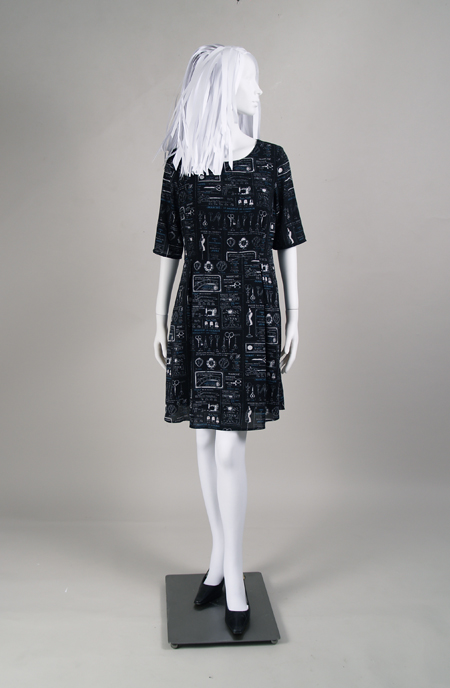
14
Black Printed Dress with Sewing Supplies Pattern
Hide & Seek, China. Purchased and worn in Canada, 2017.
Polyester knit.
Anonymous loan.
Worn with:
Black Leather Shoes
Unknown maker, likely sold in North America, ca. 1990s.
Purchase second-hand in 2018 for exhibition prop.
Paper hair by Emily Graca.
This dress, which belongs to one of the co-curators, is one she would wear to a potluck. As a 23 year-old, she purchased this piece because it could be used for many different occasions by dressing it up or dressing it down. For school, she wears it with leggings, and for dinner out, with black tights. Such versatile pieces are emblematic of our society: each piece of clothing must be able to play many roles as we shift through the many stages of the day.
15a
Lobster-Shaped Jell-O Mold
Solid Copper, Korea, 20th century.
Copper and aluminium.
Anonymous loan.
15b
Pineapple-Shaped Jell-O Mold
Unknown maker and place of origin, 20th century.
Copper and aluminium.
Anonymous loan.
15c
Glass-covered Dish
Maker unknown, likely USA, mid to late 20th century.
Glass and ceramic.
Anonymous loan.
Jell-O democratized the aspic, making it widely available. One of the molds features a pineapple, which has become a symbol of hospitality[1] and therefore very appropriate for hostessing. The visually appealing glass dish with lid is both for show and transport, and thus focuses the attention away from the hostess to the guest.
[1]Gohmann, Joanna M, 2018, “Colonizing through Clay: A Case Study of the Pineapple in British Material Culture,” Eighteenth Century Fiction 31 (1): 143–61.
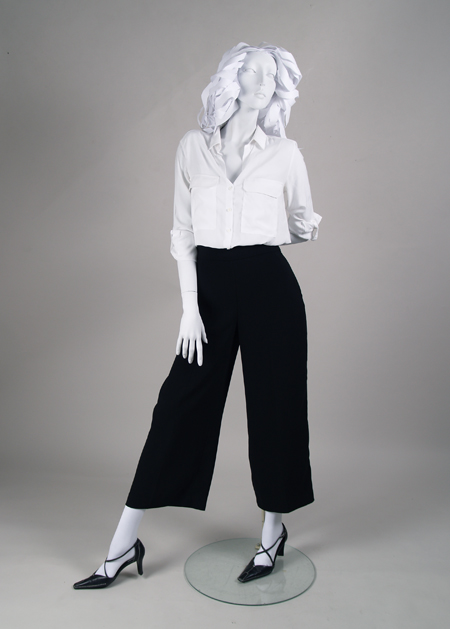
16
White Button-up Blouse
Zara Woman, Turkey, ca. 2018.
Rayon Polyester Blend, plain weave.
On loan from Leah Hrycun.
Black Wide-leg Trousers
Zara Woman, Turkey, ca. 2018.
Rayon Polyester Blend, crepe weave.
On loan from Leah Hrycun.
Worn with:
Black Leather Cross Strap Heeled Shoes with Contrasting Stitching
VS, unknown place of origin, ca. 1990s.
Anonymous loan.
Paper hair by Ryley Halbert.
This ensemble can straddle different events. However, if worn with a jacket, it would be too formal for a potluck, and despite its business-inspired style, the owner finds its lack of structure inappropriate for her line of work. This reveals the unspoken social obstacles women continue to face.
* * *
Be My Guest: The Performance of Femininity through Food & Fashion
9 April to 25 October 2019
Carolina Amaral, Anne Bissonnette, PhD, Elizabeth Brandeau, Leah Hrycun, Katelin Karbonik and Amber Peters, exhibition co-curators
